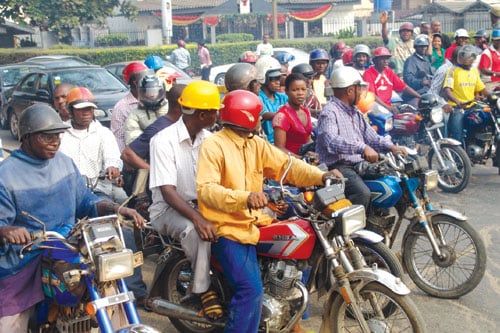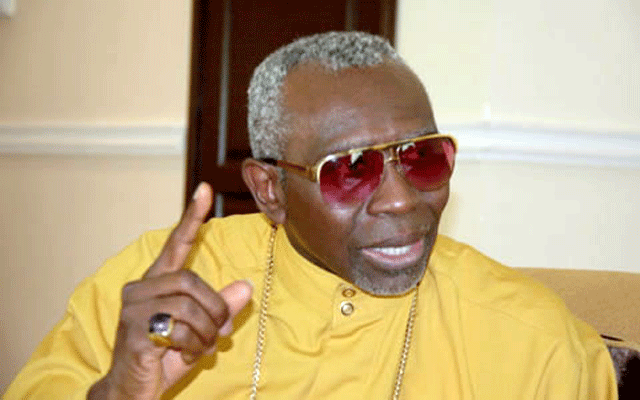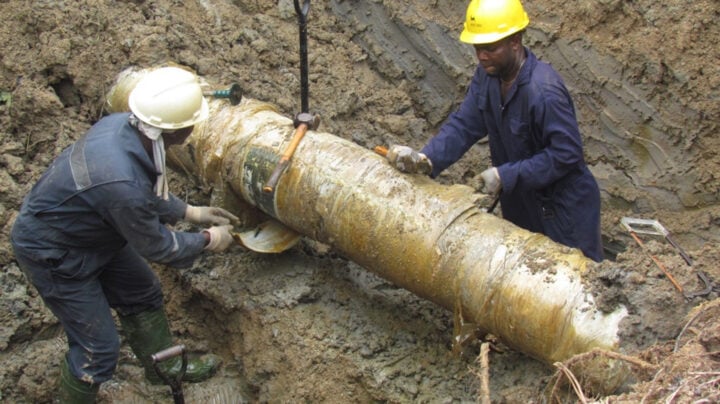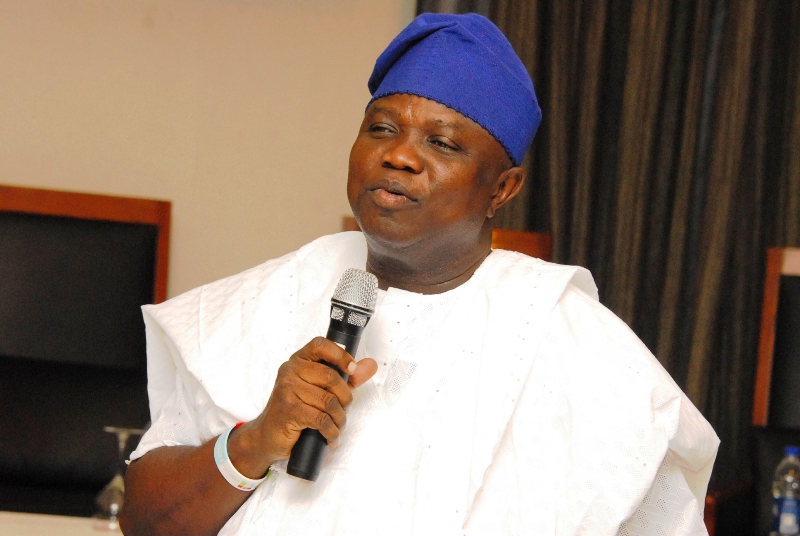You should never ask my opinion about taking Okada, the commercial motorcycle operator, off the roads of Lagos. Why? Because you will be asking the wrong person. I am biased; my opinion is premeditated and deliberately resolute on what the fate of the Okada should be. My vote is that Okada should be taken out and I will tell you why.
It was sometime in the 1990s. I had taken my first job as a journalist with the Independent Network Communications Limited (ICNL) and had been deployed to the Arts and Review Desk of the defunct AmNews.
I came to the job with the enthusiasm of all rookie reporters and would normally go to work with glee even if the torment of the country then, in the person of the late Gen. Sani Abacha had an eye on the ICNL.
Abacha made a hunting field of our offices such that our founders, Messers Bayo Onanuga, Kunle Ajibade, Dapo Olorunyomi, Idowu Obasa, Babafemi Ojudu and Seye Kehinde, being the prime game alongside a legion of subordinates, could hardly strategise to make their venture profitable. These were the days of guerrilla journalism when endangered publishers struggled to be just on the newsstands and advertisers would rather die than patronise such “satanic” papers for fear of government reprimands.
Advertisement
Salaries weren’t regular neither were our weekly transport allowances. However, journalism condones no excuses. You do not come to newsrooms empty handed telling tales about how you did not have funds to attend an assignment. Like a soldier on a mission, you either do the job or try your hands on some other trade. Nigerian journalism sure lost some of the very best of my generation to the frustration of this era, but I digress.
If you chose to stay, you got assignments done on credit and wait for the organisation to pay salaries or transport claims, whichever comes first, later. What we did then was to just find our way round getting the job done.
One afternoon, I had to attend an assignment at the Goethe Institute on Ozumba Mbadiwe Street, Victoria Island. I did a bit of the journey by bus, a bit on foot and then get on a bike from a point which would give me some fresh look without the stickiness of the walk.
Advertisement
I jumped on a bike somewhere on the Island but we could not have gone farther than 200metres when a car, driving out of the 1004 Estate, ran into us with my right leg taking the impact. The driver of the car maneuvered his way out of the scene and sped off without paying attention to two human beings writhing in pain on the ground resulting from his carelessness.
I eventually managed to get up, walked on a limp to cover the event at the Gothe Institute and then get to the office to file my story. But that would be the last time I stepped into that office for the next four week as I later discovered that the impact was more than I imagined. This incident, sort of, finally, determined my attitude to okada and its rider!
You could say that my okada rider was not exactly at fault, but the pain I suffered over the next four weeks relayed a different message to me. I recall having warned the rider on the need to reduce speed before the accident and that he did not heed. I made a mental note of that obstinacy. I am still unable to forget it.
This obstinate recklessness is typical of the average commercial motor bike operator anywhere you find him in Nigeria. I joke that they must all be possessed by the same spirit. This is in spite of the scientific evidence that the motorcycle is perhaps the most unsafe means of transportation available.
Advertisement
In addition to the visibly unsteady nature of the motorbike, the average Okada rider is Nigeria happened on the trade by accident, he is most likely a school dropout or someone who, unwilling to continue his training under a cleric somewhere in the North, took the next available escape route to Lagos, or some other city far away from his residence and convinced himself or some investor that he could ride a bike.
He is therefore untrained, most likely unlicensed and very likely bellicose at a country which has brought hard luck on him. I cannot tell with finality that his decision to drown himself in liquor, mostly of the cheapest brew (not that he is able to afford anything better) is a direct attempt to suspend his sorrows, but I know that not a few of these commercial riders are under the influence every morning when they resume on their bikes. They also find time to restock every now and then during the day. No wonder, they have no regards for traffic laws, the law enforcement agent or even the heavy duty vehicle ahead of them. With some level of intoxication, that articulated vehicle will look like nothing more than another motorcycle to him and he is ready to wangle into any space on the road. Most sad of all, both Okada operators and law enforcement agent are conveniently sleeping on the law that once imposed the use of helmets on riders and their passengers.
This, in my opinion, explains the high volume of Okada accidents in the country. It also speaks to the fact that most people do not come out of these mishaps without losing a tooth, a limb or two or sometimes, their lives entirely! When you juxtapose this with the very valid argument that these motorbikes have become operative tools in the commission of assorted crimes, you would, without doubt, sympathise with the sentiment to remove them from all our roads, maybe Lagos being a good starting point.
However, social consciousness would compel one to consider the corollary of such a blanket ban. If we agree that most Okada riders are unskilled for instance, you are then forced to ask yourself what you would be pushing them into when you take their means of livelihood and possibly that of hundreds of thousands of their dependents from them. Since we equally argue that a lot of them are already involved in one type of crime or the other, wouldn’t taking them out of business seem like unwittingly fanning the flame of their criminal activities and unleashing more harm on society? I think it would. But then, dealing with that should not be rocket science.
Advertisement
My take is that the state government needs to engage with okada riders through their association, get a data of the operators and discuss ways to get them otherwise gainfully employed. Now that the country is talking about agriculture, imagine engaging this number of able-bodied men in agricultural activities with the right incentives.
A government planning to ban the services of Okada riders must also think about the effect it would have on commuters who will have to walk long, sometimes risky distances to get to their destinations. As part of the process of making the city friendlier, government should speed up its metro line project, introduce more of its BRT buses and improve transportation on the waterways. It may also make sense to re-designate bus stops in the state so commuters will only have to walk manageable distances.
Advertisement
But then, aren’t there health benefits in walking? Doesn’t medicine suggest that walking reduces cardiac risk factors such as cholesterol, blood pressure, diabetes, obesity, vascular stiffness and inflammation, and mental stress, all silent killers which Nigerians hardly take seriously and which our public health systems scarcely prepare the citizen for? Could dealing with this okada situation not be a starting point in drawing the attention of the populace to the health benefits of taking some walk every day?
Giving Lagos a befitting megalopolis essence is a pile of efforts which includes the ease of business, well maintained infrastructure, security of lives and properties, efficient and safe means of transportation (and here, the danfo must also be dealt with. But that is talk for another day), and perhaps, most importantly, a healthy and happy citizenry. I am confident that the Akinwumi Ambode administration, if it indeed plans to take okada from the streets, is taking a holistic look at the issue such that the decision benefits everyone.
Advertisement
Follow me on twitter @niranadedokun
Advertisement
Views expressed by contributors are strictly personal and not of TheCable.
Add a comment







